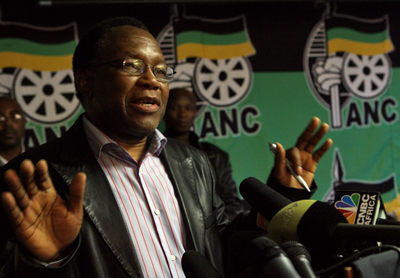For the first time in South Africa’s months-long debate over the proposal for a government-run media appeals tribunal, a top official from the African National Congress (ANC) indicated on Friday that the plan could be dropped altogether–under certain conditions.
After a meeting with the South African National Editors’ Forum (SANEF), Deputy President Kgalema Motlanthe told the local press that, if the media revises its “self-regulatory mechanisms” to “address the concerns about its shortcomings,” a tribunal may not be imposed upon them.
“A lot depends on how the concerns would be addressed. For instance, if there is an inaccurate article in a newspaper, what is the turnaround time of printing a correction?” Motlanthe asked. “Those are some of the key questions that the media itself would have to address and if those are addressed, it will remove the basis for the concerns.”
During the meeting, government officials demanded changes to the South African media’s existing mechanisms of self-regulation, particularly the Press Council and ombudsman. They called for a faster process to resolve complaints and the imposition of heavier fines on media outlets when they publish stories that are believed to violate subjects’ privacy. They also demanded faster publishing for apologies, which, they argued, should be printed just as prominently as the offending stories.
Motlanthe’s comments were welcomed with guarded optimism by some media leaders and analysts participating in a public seminar at Johannesburg’s Witwatersrand University on Tuesday. Other observers expressed confusion or skepticism.
“We are waiting for the statement from President Jacob Zuma. We hope he will not contradict his deputy on this matter because he has been one of the people pushing for this tribunal,” Editor-in-Chief Mondli Makhanya of the Avusa media group told CPJ.
Raymond Louw, a prominent journalist and a SANEF leader, took Motlanthe’s statement with a grain of salt. “I don’t think they are changing their mind and that is becoming clearer,” he said. He pointed out that the Press Council of South Africa was still awaiting a response from the ANC on a comprehensive review of its performance. “[It] gives me the indication that what they want is to hold this over the press to intimidate the press,” he added.
Professor Tawana Kupe of the University of the Witwatersrand interpreted Motlanthe’s comments as a tactical retreat in the face of significant domestic and international opposition.
He also argued that a media tribunal would not necessarily solve the the ANC’s concerns. “Even if some of [their concerns] are valid, for example, the way apologies are put and how long it takes to adjudicate cases, what they should insist on is journalists transforming their own processes of self-regulation,” he said.
Reacting to criticism of the government in the press, ANC leaders and members of its Youth League have argued that state regulators must step in to tame South African media. Party leaders have denied that their intent is to censor the press and undermine the constitutional freedoms instituted after the fall of apartheid.
The ANC raised the possibility of a media tribunal during its convention last month and tasked parliament with studying its “desirability and feasibility,” according to local press reports.
Based on Motlanthe’s recent remarks, Richard Calland, associate professor in the department of public law at the University of Cape Town, suggested the possibility that the ANC is genuinely listening to journalists. “It shows that people have woken up to the fact that secrecy provides a cloak for bad governance, unaccountable governance, and that we need to draw a line in the sand that we will not tolerate a secret society,” he told CPJ.
